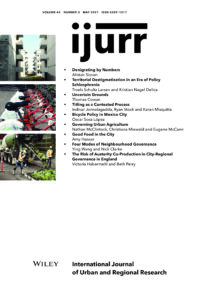Based on ethnographic research with cadastral land surveyors and revenue bureaucrats in Gurgaon, North India, this article examines how the desire to etch out and impose digitized private property titles on India’s urban frontier is mediated by the shifting socio‐materiality of bureaucratic work. The article argues that bureaucratic uncertainty structures the commodification of rural land in Gurgaon, and explores how digital technologies, designed to produce clarity, are being wielded by powerful groups to flexibly settle property claims. The bureaucratic office and cadastral survey are sites where competing actors ‘work’ land’s intrinsic pliability, mobilize conflicting documentation, manipulate bureaucratic materials and navigate unmapped property claims in pursuit of territorial claims. In this context, much heralded digital property governance systems, the article argues, are not about producing clarity but rather capturing the conditions of uncertainty. Exploring the practices of surveyors and bureaucrats as they encounter land’s shifting materiality and work with its multiple, conflicting representations, reveals the ways in which digitized property systems remain materially bound and always socially mediated, contested and secured.

